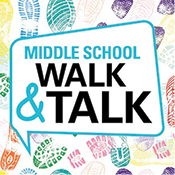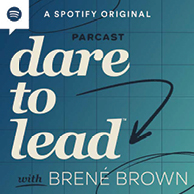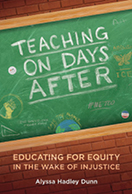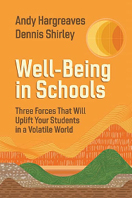Syllabus: March 2022
“Middle School Walk & Talk” Podcast

With kindness and hope, “Middle School Walk & Talk,” a podcast by the Association for Middle Level Education (amle.org/middle-school-walk-and-talk-a-podcast-series), addresses issues facing middle school students and communities. Hosts Phyllis Fagell, a school counselor and journalist, and Joe Mazza, a middle school principal, draw on their own experiences and the expertise of their guests: adolescent psychologists, parents, district and school leaders, teachers, and middle schoolers. Each episode focuses on a specific issue related to the social-emotional well-being of young teens, with multiple episodes exploring the challenges posed by COVID-19. For example, in “Cultivating a Culture of Belonging With Phillip Marcus,” the director of diversity, equity, and inclusion for one school district discusses strategies for schools to use in understanding what students need as they return to in-person learning. In another episode, “Supporting Students Struggling Socially,” Katie Hurley—a psychotherapist, parent-educator, and author—discusses supporting students in moderating their social media consumption for their own mental health. With episodes of about 25 minutes each, “Middle School Walk & Talk” is the ideal length to listen to while taking a short walk and reflecting on what it means to serve middle school students.
“Dare to Lead with Brené Brown” Podcast

Leaders in various fields likely know of Brené Brown from her widely viewed TED talk, “The Power of Vulnerability,” and her research on shame. In “Dare to Lead” (brenebrown.com/podcasts), Brown interviews a wide range of leaders on their personal path to leadership and their thoughts on what it takes to be a courageous leader. While this podcast is not specifically geared toward educators, many stories and lessons directly relate to the work that school leaders do each day. For instance, in the episode, “A Meeting Makeover,” Brown interviews Priya Parker—a master facilitator, strategic advisor, and author of the book, The Art of Gathering: How We Meet and Why It Matters—on how to structure meetings in ways that allow people with divergent perspectives and disparate levels of power to make meaningful connections and agree on the purpose of their collective work. In another episode, “The Advice Trap and Staying Curious Just a Little Longer,” Michael Bungay Stanier, executive coach and author, discusses the management skill of posing questions to bring out the best in people and create organizations where everyone can flourish.
Teaching on Days After: Educating for Equity in the Wake of Injustice

On days after catastrophic events, educators across the country must make important decisions about how to acknowledge students’ questions and concerns. In her new book, Teaching on Days After: Educating for Equity in the Wake of Injustice (Teachers College Press), Alyssa Hadley Dunn, an associate professor of teacher education at Michigan State University, thoughtfully describes how schools can and must create authentic opportunities for students to process, understand, and respond to events including natural disasters, political turmoil, racial injustice, and gun violence. Drawing on interviews with teachers, Dunn shares examples of how educators adapt their curricula in the wake of these events, and many cite the need to have a supportive administration. Perhaps most compelling are the short sections between chapters in which students reflect on their schools’ responses to the shootings at Sandy Hook Elementary and Marjory Stoneman Douglas High School, the Jan. 6, 2021 attack on the U.S. Capitol, the start of COVID-19, and the murder of George Floyd. This book is a valuable resource for school leaders looking to prepare teachers for the task of ensuring that classrooms are safe spaces for students on “days after.”
Well-Being in Schools: Three Forces That Will Uplift Your Students in a Volatile World

The concept of well-being in schools is hardly new, though it has gained increasing attention. In Well-Being in Schools: Three Forces That Will Uplift Your Students in a Volatile World (ASCD), education scholars Andy Hargreaves and Dennis Shirley provide a nuanced framework for approaching well-being in schools, with attention to both our history of over-testing and standardization and our uncertain future given the pandemic and climate change. Throughout, they discuss an array of questions, such as: “Does the well-being agenda wrongly claim to be able to solve massive social problems with individualistic, psychological solutions?” and “What’s the point of having initiatives in well-being if other parts of the school system are perpetuating ill-being?” Ultimately, they argue for “the Prosperity Doctrine,” which acknowledges that the best approach to student well-being is alleviating wide-scale social inequality, moving away from standardized achievement tests, and reinvesting in education with an emphasis on funding for mental health services. The authors also call for an ethical and thoughtful approach to technology, an increased focus on giving students opportunities to interact with nature, and an acknowledgment that the well-being of adults in schools must be taken as seriously as students’ well-being. At a time when illness is pervasive and stress levels are high, this book provides much-needed insight into the role schools play in the overall health and well-being of society.
